
- Homepage
- Binding
- 1 / 2 Leather (2)
- 3 / 4 Leather (2)
- Brochure / Pamphlet (4)
- Cloth (87)
- Disbound (3)
- Fine Binding (52)
- Hard Back (2)
- Hard Cover (4)
- Hardback (6)
- Hardcover (887)
- Hardcover Sheepskin (2)
- Hardcover W / Jacket (5)
- Hardcovers (2)
- Leather (246)
- Original Blue Cloth (2)
- Quarter Leather (3)
- Softcover (3)
- Softcover, Wraps (41)
- ... (3511)
- Language
- Region
- Theme
- Topic
- American (us) (22)
- American Civil War (14)
- American History (4)
- Atlases (4)
- Bible (5)
- Christianity, Bibles (83)
- Christmas (4)
- Civil War (50)
- Civil War (1861-65) (890)
- Classics (6)
- Essays & Speeches (3)
- Historical (34)
- Literature (5)
- Military (24)
- Plantation Life (6)
- Reference (3)
- Religion (6)
- The Civil War (4)
- U.s. Grant (13)
- United States (30)
- ... (3654)
- Year Printed
Civil War Muster Roll 1862 New York 68th Regiment Volunteers Second Bull Run NY


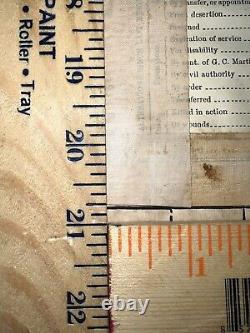
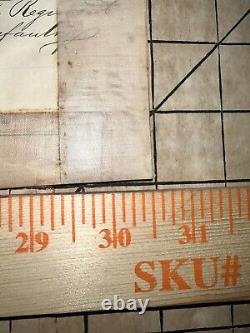
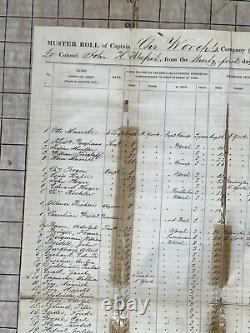
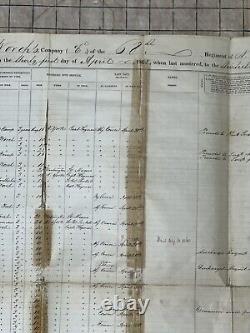
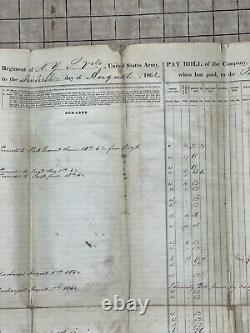
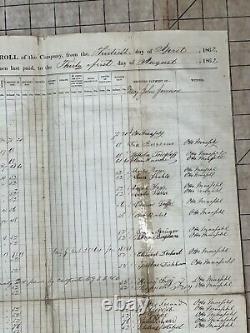
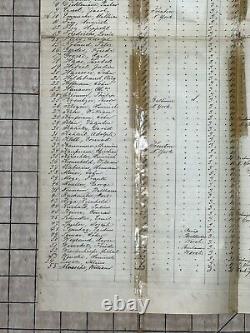
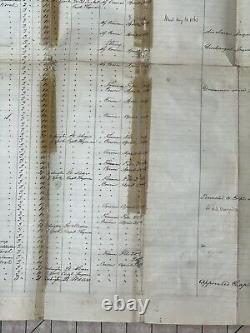
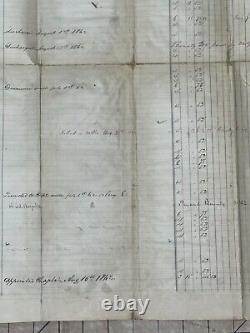
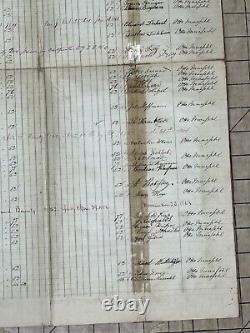
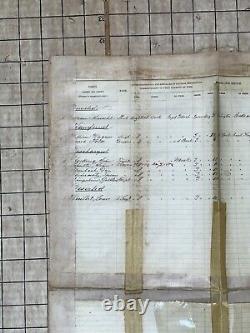
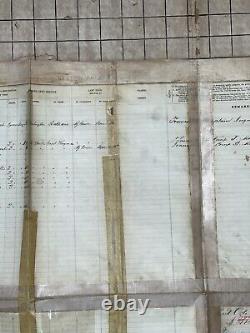
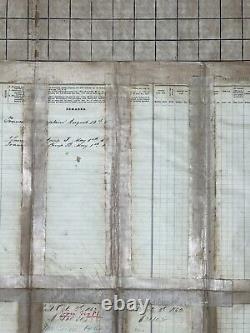



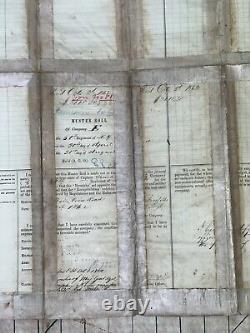
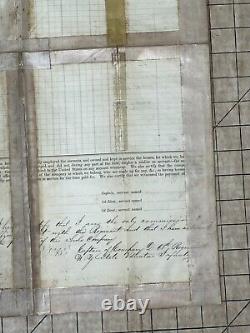


READ ENTIRE TITLE & DESCRIPTION AND VIEW ALL PHOTOS AS I USE MY OWN GENERATED TEMPLATE FOR LISTING. QUANTITIES OF SIMILAR ITEMS DAILY. ALL ITEMS ARE CONSIDERED PRE-OWNED AND IN READABLE CONDITION. ITEM : Civil War Muster Roll 1862 NY New York State 68th Regiment Company " E " Volunteer Infantry from April 30 through August 31 which includes the Second Bull Run battle where several below perished in battle, see remarks section. Heavily taped and with tears or creases...
Clean, crisp handwriting for genealogy research. Some of my own findings from online research during the dates of this document... In June the Regiment lost two enlisted men in the Battle of Cross Keys; later fighting in Pope's Campaign in northern Virginia, then the Battle of Groveton and lastly the Second Battle of Bull Run on August 30 where Lt. Col Kleefish and 21 enlisted men were killed or mortally wounded, 59 injured and 11 went missing. 1st Sgt Otto Mussehl would later be captured in the Battle of Gettysburg in 1963.
Chaplain William Mussehl is in the text of "A Gallant Captain Of The Civil War: Being the Record of the Extraordinary" an autobiography by Friedrich Otto Freiherr von Fritsch that details his experiences with the 68th. Several individuals with same last names or same family members serving together. Names on Document & (remarks): Captain Christopher Worch Lt. Colonel John H Kleefish Sergeants: 1stSgt Otto Mussehl (promoted) Sgt Frederick Berghaus Sgt Julius Mueller Sgt William Trieglaff (Promoted) Sgt Herm Mussehl (promoted) Corporals: Cpl Charles Bogen Cpl Louis Kahle Cpl John Hoyer Cpl Edward Hager Cpl Charles Kochler Wagoner: Ohlmer Biechler Drummer: Christian Wiebet. The reverse side of this document states the following: The promotion of William Mussehl.
The Transfer of Sgt William Wagner and Drummer Jacob Folk. The Discharge of Privte John Glosking, Private John Schultz, Private Van Kleenbach, Private Thadius Fordenaty and Corporal Gottlieb Zingsheim. The Desertion of Louis Knillet. There are notations that are a bit hard to decipher at the bottom of this side.
Which appea r to be from M ajor G eneral Franz Sigel, possibly in his handwriting, which also mentions Major Stephen Kovacs who, from Wikipedia, commanded at the Battle of Chancellorsville after Ltc Ashby was captured; commanded at the Battle of Gettysburg where he was captured on July 1. The 68th New York Infantry Regiment served in the Union Army during the American Civil War. Also known as the Cameron Rifles or the Second German Rifle Regiment, the men were mostly German immigrants. Organized in July 1861, three months after the outbreak of war, the 68th saw service in the Eastern and Western theaters.As a part of the Army of the Potomac, it was initially assigned to the defenses of Washington, D. Later, the 68th was transferred to the Shenandoah Valley and fought at the Battle of Cross Keys. The men of the 68th were then reassigned to central Virginia and found themselves in the thick of the fighting at Second Bull Run. After returning to the nation's capital, the regiment fought in Chancellorsville and was routed by Confederate forces.
At Gettysburg, they saw battle on two of the three days and took heavy losses. The regiment was then transferred to the west and participated in the Chattanooga Campaign.
The 68th fought in the battles of Wauhatchie and Missionary Ridge, assisting in the Union victories there. The regiment marched to relieve the siege of Knoxville, and then spent the last year of the war on occupation duty in Tennessee and Georgia, before being disbanded in November 1865.
On July 22, 1861, the United States War Department authorized Robert J. Betge to raise a volunteer infantry regiment in New York.
Recruited to serve for three years, the men came mostly from Manhattan (New York City), and also from New Jersey, Maryland, and Pennsylvania. The mostly German immigrants were also called the "Second German Rifles" (the First German Rifles, raised several months earlier, were the 8th New York Volunteer Infantry Regiment), but Betge called the regiment the "Cameron Rifles", after Secretary of War Simon Cameron.The officers were also German, and many had served in the armies of Austria, Prussia, and other German states. In all, 1,020 men filled the ranks when the regiment had finished recruiting. Accepted into service on August 19, the 68th left New York the next day, traveling by train from Perth Amboy, New Jersey, to Washington, D.
To join the brigade of Brigadier General Louis Blenker in the Army of the Potomac. Blenker was a German immigrant himself, a refugee of the Revolutions of 1848, and many of the units under his command were heavily German-American. Encamped at Roach's Mills, Virginia, the 68th participated in the defense of Washington, losing three men in their first combat, a minor skirmish with a Confederate patrol. In November, the Army was reorganized; the 68th was shifted to Colonel Adolph von Steinwehr's brigade and Blenker moved up to command the division. They encamped at Hunter's Chapel, Virginia, for the remainder of the winter.There, Betge was brought before a court-martial, accused of "conduct unbecoming an officer and gentleman":confiscating two horses and other property from "loyal" Virginia citizens, and taking a bribe to hire the 68th's regimental sutler. He was not convicted, and was permitted to return to the regiment. In March 1862, the Army was again reorganized and Blenker's brigade was merged into the II Corps, led by Maj.
That month the 68th moved to Warrenton, Virginia, where it came into contact with Confederate cavalry; three of the officers were captured. The following month, Blenker's brigade was moved into Maj. Frémont's Mountain Department, necessitating a march to Winchester, Virginia, where the 68th and the rest of Frémont's army guarded the western part of the Shenandoah Valley against incursions by Confederate forces under Lt.
Their long march had left the 68th bereft of supplies and low on rations. Colonel Betge protested against the mistreatment of his regiment, and was placed under arrest, surrendering command to Lt. Kleefish Note: LEADER OF COMPANY "E" OF THE 68th REGIMENT OF THIS VERY DOCUMENT. The initial action in Jackson's Valley Campaign took place to their east, but in June Frémont's force of 15,000 joined the 10,000-man division of Brig. James Shields to converge on Jackson south of Massanutten Mountain. Jackson was determined to attack the two Union columns separately and arranged half of his troops to block Shields on the right side of the mountain, while the other half, commanded by Maj. Ewell, blocked the left side. Jackson's wish was realized when, on June 8, Frémont's army attacked. Frémont, believing he was striking Jackson's rear, instead attacked Ewell head-on, and Jackson soon brought his whole force to bear on the Union troops in the Battle of Cross Keys. The men of the 68th came under concentrated fire for the first time but were not heavily involved in the battle, although two men were killed. The battle was a defeat for the Union, and Frémont's force did not attack again, being blocked instead by a small holding force from Ewell's wing. The rest of Jackson's force then turned to attack Shields's army the next day at Port Republic.Frémont's infantry did not figure in the battle, another Confederate victory, though his artillery shelled the enemy from long range. After the battle, the 68th marched to Cedar Creek and the army was placed under the overall command of Maj.
John Pope; Frémont's force was designated the First Corps of the Army of Virginia. Frémont, who outranked Pope, resigned in protest, and President Lincoln accepted the resignation.
Lincoln replaced him with Maj. Franz Sigel, who had been commanding troops in the Western theater.
Sigel was, like many in the First Corps, a German immigrant, and the 68th and the other German regiments in the First Corps were happy for the change in commanders. Sigel ordered the 68th to Luray for picket duty. When they arrived, Betge resigned his commission and Kleefish continued to command the regiment until a new colonel could be assigned.
The regiment remained in the Shenandoah Valley until August 1862 when they joined Pope's army and moved south to engage Robert E. Lee's Army of Northern Virginia. They arrived the day after the Battle of Cedar Mountain, and joined Pope's army in its retreat from that Confederate victory.
[20] After a series of minor actions along the Rappahannock, Pope's forces met Jackson's half of Lee's army near Manassas Station. [21] Lee had divided his army into wings led by Jackson and Lt. James Longstreet and sent Jackson's force to raid Pope's rear to cut his supply line. Pope believed he had a chance to destroy the Army of Northern Virginia one half at a time, and made the decision to attack. Jackson's men struck the first blow, however, and drove off a portion of the Union force.
The next day, having taken up a strong defensive position along an unfinished railroad, Jackson awaited Pope's advance. Pope obliged him, sending the Army forward against Jackson's lines. The 68th and the rest of Sigel's corps occupied the middle of the advancing line. They were unable to break Jackson's lines, and withdrew. The Cameron Rifles had seen some action at Cross Keys, but this was their first experience of fierce fighting and they acquitted themselves well, despite the failure of the attack. By the afternoon, Longstreet joined Jackson with the other half of Lee's army and attacked the Union left. Longstreet believed it was too late for an attack, and did not attack that day, other than in a minor clash where his lines met some federal units at dusk. The next day, August 30, Pope attacked Jackson again at 3:00 p. Again, the attacking forces could not overcome their enemies' positions, and this time Longstreet counterattacked and forced them back toward their original positions. Sigel's forces, which did not take part in the initial Union assault, held firm against the Confederate counterattack, but after heavy casualties the army retreated. Among the casualties were 22 killed from the 68th (including Kleefish) and 59 wounded, making Second Bull Run one of the unit's bloodiest engagements. The Army of Virginia retreated nearly all the way back to Washington.Pope was relieved and Maj. McClellan placed in charge of the army once more. After burying Kleefish in Washington, the 68th redeployed to Fairfax, Virginia. With Kleefish dead and Betge having resigned, command of the regiment fell temporarily to Major Carl von Wedell.
The officers then petitioned the Governor Horatio Seymour to commission Gotthilf von Bourry d'Ivernois as their new colonel, which he did. Von Bourry, a veteran of the Austrian army, had served on Blenker's staff as a captain and had impressed the officers of the 68th with his tales of heroism in the Second Italian War of Independence. PLEASE VIEW ALL PICTURES AS LIGHTING ON PRODUCT MAY VARY. MOST OFTEN THE DARKER THE PHOTO IS MOST DESCRIPTIVE OF THE ITEM COLOR.PLEASE NOTE: PRE-OWNED, unless stated otherwise in TITLE. ACCEPTABLE CONDITION OR BETTER, MAY HAVE SOME IMPERFECTIONS OF SLIGHT WEAR SUCH AS DUST, DIRT OR SLIGHT MARKS. PLEASE SEE ALL PHOTOS AND DESCRIPTION FOR THE DETAILED CHARACTERISTICS OF THIS TREMENDOUS COLLECTIBLE!
IF I SEE CONDITION ISSUES, I WILL POST THEM IN THE PHOTOS! CHECK OUT OUR OCCASIONAL 33% OFF ITEMS AT Fun Lovin Resellers! HUNDREDS OF BOOKS, INCLUDING SIGNED FIRST EDITIONS, FANTASTIC FASHIONS AND ANTIQUE / VINTAGE COLLECTIBLES. THANK YOU TO ALL OF OUR GREAT CUSTOMERS.
